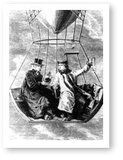Gay-Lussac, Joseph Louis

Joseph Louis Gay-Lussac (1778–1850) grew up during both the French and Chemical Revolutions. His comfortable existence as the privately tutored son of a well-to-do lawyer was disrupted by political and social upheavals: his tutor fled, and his father was imprisoned. Joseph, however, benefited from the new order when he was selected to attend the École Polytechnique, an institution of the French Revolution designed to create scientific and technical leadership, especially for the military. There his mentors included Pierre Simon de Laplace and Claude Louis Berthollet, among other scientists converted by Antoine-Laurent Lavoisier to oxygen chemistry. Gay-Lussac's own career as a professor of physics and chemistry began at the École Polytechnique.
He shared the interest of Lavoisier and others in the quantitative study of the properties of gases. From his first major program of research in 1801–1802, he concluded that equal volumes of all gases expand equally with the same increase in temperature: this conclusion is usually called "Charles's law" in honor of Jacques Charles, who had arrived at nearly the same conclusion 15 years earlier but had not published it. In 1804 Gay-Lussac made several daring ascents of over 7,000 meters above sea level in hydrogen-filled balloons—a feat not equaled for another 50 years—that allowed him to investigate other aspects of gases. Not only did he gather magnetic measurements at various altitudes, but he also took pressure (Atmospheric pressure), temperature, and humidity measurements and samples of air, which he later analyzed chemically. In 1808 Gay-Lussac announced what was probably his single greatest achievement: from his own and others' experiments he deduced that gases at constant temperature and pressure combine in simple numerical proportions by volume, and the resulting product or products—if gases—also bear a simple proportion by volume to the volumes of the reactants.
With his fellow professor at the École Polytechnique, Louis Jacques Thénard, Gay-Lussac also participated in early electrochemical research, investigating the elements] discovered by its means. Among other achievements, they decomposed boric acid by using fused potassium, thus discovering the element boron. The two also took part in contemporary debates that modified Lavoisier's definition of acids and furthered his program of analyzing organic compounds for their oxygen and hydrogen content.
Further Reading
1 Comment
Natasi Sergeeva wrote: 10-31-2012 00:10:06
Even having one eye left Gay Lussac remained a cheerful person! Just read it in the this story http://www.fampeople.com/articles-joseph-louis-gay-lussac-the-quantity-means-nothing